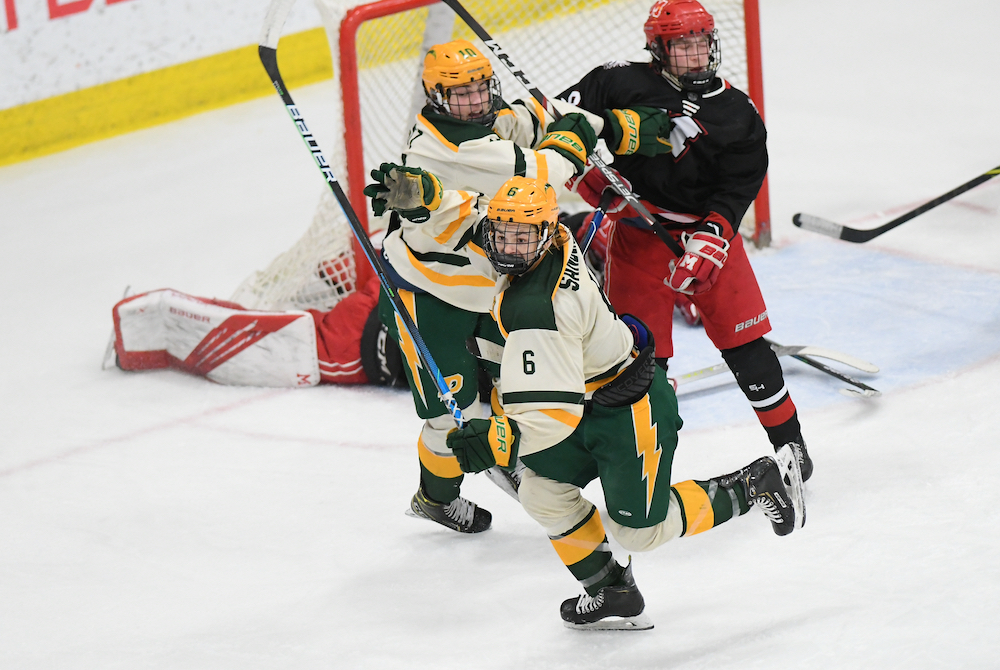
Unbeatable Goalie, Unrelenting Effort Earn Dow Memorable 1st Title
March 12, 2022
PLYMOUTH — When Collin Lemanski plays the way he did on the biggest of stages, his hockey coach is well within his rights to promote him to the fullest.
While identifying his players in a postgame press conference, Midland Dow coach Dick Blasy introduced the player seated to his left in full goaltending equipment as “best goalie in the state, Collin Lemanski.”
Care to elaborate?
“You can’t do this without goaltending,” Blasy said after Dow won its first MHSAA hockey championship with a 2-0 victory over Orchard Lake St. Mary’s in the Division 3 Final on Saturday at USA Hockey Arena.
“How many shots did they have today? 32? How many goals did they get? I think that speaks for itself. Orchard Lake St. Mary’s brought it. I don’t think it takes a rocket hockey fan to know they took it to us more than we took it to them.”
It was the seventh shutout of the season for Lemanski, who finished with an 18-3-3 record, a 1.29 goals against average and a .950 save percentage.
“I think it’s less about the shutout and more about the team just winning it, our first win,” Lemanski said. “It was great.”
Lemanski said he didn’t treat the championship game any differently than another game, going through his usual pregame routine.
One of the staples of his pregame ritual is this: “Just don’t talk to me,” he said.
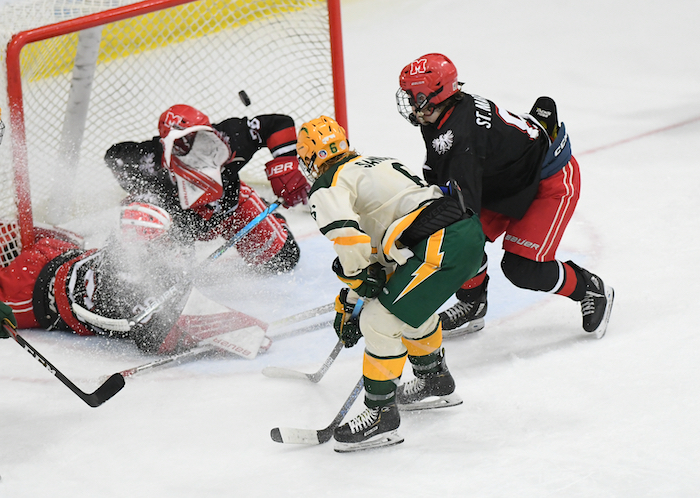 With Lemanski putting up an impenetrable barrier in front of the Dow net, the Chargers hung around throughout the game until they got the break they needed.
With Lemanski putting up an impenetrable barrier in front of the Dow net, the Chargers hung around throughout the game until they got the break they needed.
Caden Chritz, who was robbed earlier in the period, broke to the net and took a shot that was stopped by Eaglets goalie Aidan Klingbeil. Nolan Sanders pounced on the rebound to score with 2:29 left in the third period.
“We knew we were gonna get our chances,” Sanders said. “They had their chances. My line took it into the zone, put it on net, got it in front and just tapped it home.”
With so little time on the clock, the Chargers couldn’t get caught up in thinking they had just won the championship.
“We’ve got to keep our composure, got to stay simple until the final buzzer,” Sanders said. “Just let things roll out.”
Dow couldn’t breathe easily until Ryan Pomranky banked a pool shot from his own end off the left boards and into an empty net with 17.7 seconds remaining.
Dow is the first of Midland’s two hockey teams to win an MHSAA championship. Midland High was a runner-up in 1994, 2008 and 2010. Dow reached the Semifinals three times without getting to the championship game, including in 2020 when MHSAA tournaments were shut down because of COVID-19 restrictions.
“It just doesn’t seem real, to be honest with you,” Blasy said. “I checked the scoreboard about 50 times; it’s still there. It’s still 2-0. It’s unbelievable, but it’s always about the boys. That’s all I really truly care about is the fact that they did this. Whether we won or we lost, it doesn’t really change things. I would’ve been just as proud of these boys if we would’ve come out on the other end, because they just worked so hard.”
Orchard Lake St. Mary’s reached the championship game by running a gauntlet that included defeating 2021 Division 3 champion Bloomfield Hills Cranbrook Kingswood in the Regional Final and second-ranked Warren De La Salle Collegiate in overtime in Friday’s Semifinal.
The Eaglets were playing in Division 3 for the first time since winning that division in 2005. They reached three Division 1 Finals, winning two, before choosing to make the switch.
“We made the decision to change, just because we felt that Division 3 was probably the strongest route,” St. Mary’s coach Brian Klanow said. “Certainly, we’re not a team that runs away or hides from competition; we encourage it. It just makes us better for this time of year. Division 3 this year, we think it’s the deepest division.”
PHOTOS (Top) Midland Dow’s Nolan Sanders celebrates after sending a rebound into the net for what would be the game-winning goal of the Division 3 Final. (Middle) Sanders’ chip in made it just over an outstretched goalie’s glove. (Click for more from HighSchoolSportsScene.com.)
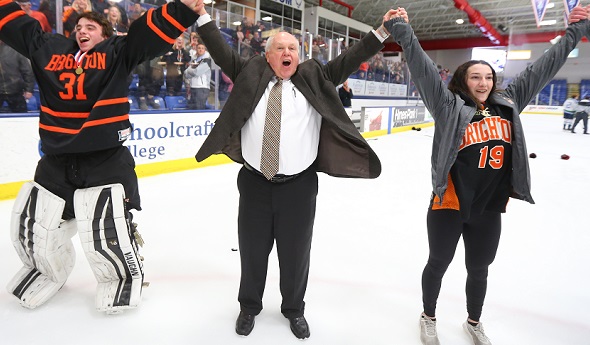
Brighton Coach's Impact 'Immeasurable'
By
Tim Robinson
Special for MHSAA.com
October 7, 2020
By Tim Robinson
Special for Second Half
Paul Moggach has never been much for looking back.
 And as he begins his first season away from the Brighton hockey program in more than three decades, he’s still looking ahead.
And as he begins his first season away from the Brighton hockey program in more than three decades, he’s still looking ahead.
“I’m thinking about what I’m going to miss more than the mark I left,” he said in a phone conversation last week. “I guess I enjoyed so much of the time I had, the opportunity to coach at Brighton, I’m thinking more how I fill the time and the things I'll miss.”
Moggach (pronounced MUG-uth) retired as Brighton’s coach this past summer after 25 seasons and having led five teams to MHSAA Division 1 championships. He compiled a record of 466-172-47 during that period.
But that’s not what he remembers most, nor why he wants people to remember him.
“I would like them to remember the teams and players who played for me and my assistants, more than me,” Moggach said. “We have so many blessings and opportunities in our lives, and hockey was one for me and hopefully for the players and assistants I worked with.”
One of those assistants was Kurt Kivisto, who joined the Bulldogs originally as a team manager more than 20 years ago and was a player at Brighton. He eventually won a national championship at Michigan State before rejoining the program as an assistant coach a decade ago.
“The No. 1 thing I’ll take from him is sticking by your beliefs and not sacrificing those beliefs for the team,” said Kivisto, who was named Moggach’s successor in September. “He sticks by those beliefs and ... he’s not willing to sacrifice that even if it could hurt the team. The character and integrity he has, how he treats people with fairness and what he believes is right is the biggest thing I’ll take.”
A stepson, Damon Whitten, played for Moggach at Brighton and at MSU before becoming an assistant coach and eventually the head coach at Lake Superior State, where he is in his eighth season.
Asked about Moggach’s impact at Brighton, Whitten said, “I’m not sure you can measure it. Your mind goes to the hockey players who have come to Brighton, and that’s a big part. But I think it goes beyond that. The money they’ve raised over the years for different families in need, for example. He’s had a big impact, and the players he had were a big part of that, but it goes well beyond that, and he did it the right way. Thirty-plus years (in the program), and I’m not sure you can count more than a handful of times where he made a bad decision or handled things poorly. He did things the right way, every day, all of the time, and I think it’s why he was so successful for so long.”
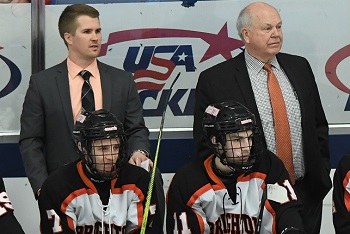 The team’s charitable works were mostly kept under the radar – Moggach’s reasoning being his players had been given much, it was their turn to give back, and he didn’t want people thinking they did those things for publicity.
The team’s charitable works were mostly kept under the radar – Moggach’s reasoning being his players had been given much, it was their turn to give back, and he didn’t want people thinking they did those things for publicity.
Moggach joined Rick Bourbonais as an assistant at Brighton in the mid-1980s, then switched roles with him for the 1996-97 season.
He realized Brighton’s potential in the 1992-93 season, when the Bulldogs upset perennial state power Trenton in the Class A Quarterfinals before losing to Detroit Catholic Central in a Semifinal.
“That, to me, said, at least in my mind, that we can do this,” Moggach said. “It’s not impossible.”
He slowly began to build the program, getting good players and a schedule that would challenge them.
“You get the players by building a good culture,” he said. “Back in the day, when I started, we weren’t very disciplined and our league wasn’t very disciplined. So I think we realized we had to build that, and I could have an influence on building that in Brighton.”
Along with the culture, Moggach looked for an edge whenever he could find it. He was talked into making a trip to the Keweenaw Peninsula by one of his player’s parents, and found enormous benefits for his team, both competitively and in team bonding.
“It’s a lot about the little things we do,” he said, “that we find joy in, and create those opportunities. Creating the little moments really can build to bigger moments. We played capture the flag one day in about two feet of snow.
“Almost killed them,” he added, chuckling. The exhausted players didn’t have much left for the game that night, but spending time together for four days in a bus and hotel room always brought the team closer on and off the ice.
That first UP expedition also led to more teams making the trip, for team bonding and a glimpse of a part of the state, and themselves, they might never have seen otherwise.
“We didn’t do that for long,” he said. “But we always came back saying we were better together because of that experience.”
Bob Nelson had three sons play for Moggach, and Nelson’s wife, Kris, was president of the team’s booster club during their involvement over nearly a decade in Brighton hockey. Nelson also coached the program’s younger players for five seasons.
“We got to know the Moggachs really well,” he said. “It was a good experience, both as a coach and as a parent as well.”
Moggach introduced other things, including an emphasis on nutrition and off-ice training, that players resisted at first until they saw the benefits.
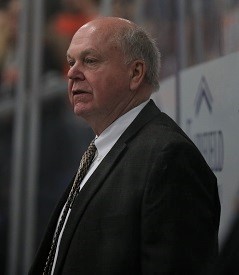 He savored conversations with referees and opposing coaches before the games and even the occasional reporter after games.
He savored conversations with referees and opposing coaches before the games and even the occasional reporter after games.
But his first priority was the players. At times he would erupt in practice at a player or, more commonly, the team, and the boys soon learned to hear the message, not the volume. But for a couple of seasons, they also wrote some of his wilder statements down in a notebook after practice.
One year, they read some of them at the banquet, and after each one, Moggach’s wife, Sharon, would look at him and ask, “Did you really say that?”
Moggach would laugh and confess to remembering he had actually done so, then laughing.
“He knew part of what made the program good was his relationship to the players,” Nelson said. “If it was a good time, he wanted to enjoy it, even at his own expense at times.”
Moggach has staying in the background this offseason, letting Kivisto shape the team.
Asked if he were willing to fully switch coaching roles, as he and Bourbonais did a quarter-century ago, Moggach laughed.
“No,” he said emphatically. “Rick wasn’t in his 70s when we made the switch. Kurt needs his time. I’ll be there if he needs me.”
Moggach, who is 74, still works fulltime as the University of Michigan’s director of risk management.
He plans to spend more time with his wife and watch his grandsons play hockey, as well as catching some Lake Superior State games.
“I was really blessed to have Rick and Brownie (longtime assistant Mike Brown) along for the ride, and then to get Kurt involved,” Moggach said. “They weren’t the only ones, but they were the kids for me.
“The other thing is the support from the Brighton (High School) administration, the teachers, and our community. There are more people to thank than I could ever bring up. I do think that, all together, it was a great run. It couldn’t have been any better.”
PHOTOS: (Top) Recently-retired Brighton hockey coach Paul Moggach celebrates the 2018 Division 1 championship game win over Saginaw Heritage at USA Hockey Arena. (Middle) Former player Kurt Kivisto, left of Moggach during the 2018 Semifinal win over Detroit Catholic Central, served as an assistant before assuming the head coaching job in September. (Below) Brighton's 2018 championship was its fifth under Moggach. (Photos by Hockey Weekly Action Photos.)

